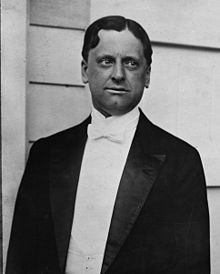Roland Sletor Morris (March 11, 1874 – November 23, 1945) was an American lawyer and diplomat. He was one of the founders of the Philadelphia-based law firm Duane Morris in 1904 and served as the United States Ambassador to Japan from 1917 to 1920.
Roland S. Morris | |
|---|---|
 | |
| United States Ambassador to Japan | |
| In office October 30, 1917 – May 15, 1920 | |
| President | Woodrow Wilson |
| Preceded by | George W. Guthrie |
| Succeeded by | Charles B. Warren |
| Personal details | |
| Born | March 11, 1874 Olympia, Washington, U.S. |
| Died | January 23, 1945 (aged 70) |
| Resting place | Laurel Hill Cemetery, Philadelphia, Pennsylvania, U.S. |
| Political party | Democratic |
| Education | Princeton University (A.B., L.L.B.) |
Early life and education
editHe was born in Olympia, Washington in 1874 and graduated from the Lawrenceville School in 1892.[1] He received his A.B. degree from Princeton University in 1896 and his L.L.B. degree from the same school in 1899.[2]
Career
editIn 1904, he became a member of the law firm Duane, Morris and Heckscher.[2]
He was appointed United States Ambassador to Japan by Woodrow Wilson[3] on August 1, 1917 and served in that role from October 30, 1917 to May 15, 1920.[4]
On September 20, 1917, a special dinner event was held to honor Morris in his new position as Ambassador to Japan. This event was attended by six hundred guests, including most members of Philadelphia judiciary and other active civic members of the city. The speakers at this diplomatic gathering included: Thomas B. Smith Mayor of Philadelphia, Aimaro Satō Japanese Ambassador to the U.S., Frank Lyon Polk (Counselor for the U.S. Department of State), Alexander Mitchell Palmer (soon to be U.S. Attorney General) and Robert von Moschzisker (Justice of the Supreme Court of Pennsylvania from 1909 to 1921 and Chief Justice from 1921 to 1930). Other prominent guests included U.S. Senators Boies Penrose and Philander C. Knox. The event took place at the Bellevue-Stratford Hotel, in Philadelphia.[5][6]
Morris conducted a series of negotiations with Kijūrō Shidehara, the Japanese Ambassador to the United States, to address alien land laws which limited the ability of Japanese immigrants to achieve full citizenship in the United States.[7] Morris maintained good relations with Japanese colleagues after his stint as ambassador and welcomed diginitaries such as Tsuneo Matsudaira to present to the Philadelphia Chamber of Commerce in 1925.[8]
He collaborated with Thomas Garrigue Masaryk during World War I in a question about the Czechoslovak Legions.[9][10]
In 1934, he lost the Pennsylvania Democratic U.S. Senate primary to Joseph Guffey, who was subsequently elected.[11]
He was one of the founding partners of the law firm of Duane Morris, in Philadelphia.[12]
He was interred at the Laurel Hill Cemetery in Philadelphia.[13]
Publications
edit- Report of the Honorable Roland S. Morris on Japanese Immigration and Alleged Discriminatory Legislation Against Japanese Residents in the United States, Washington, D.C.: Government Printing Office, 1921
References
edit- ^ Roland S. Morris Papers, 1855-1988 (mostly 1915-1929), Princeton University. Accessed September 11, 2023. "Morris attended the Lawrenceville School before entering Princeton University in September 1892."
- ^ a b "Roland S. Morris Papers - A Finding Aid to the Collection in the Library of Congress" (PDF). findingaids.loc.gov. Library of Congress. Retrieved 10 September 2023.
- ^ Street, Julian (1921). Mysterious Japan. Garden City, NY: Doubleday, Page & Company. p. 244. Retrieved 19 September 2023.
- ^ "Roland Sletor Morris". history.state.gov. United States Department of State. Retrieved 11 September 2023.
- ^ Katz, Stan S. (2020). "Sept. 20th, 1917 Dinner Event to Honor the new U.S. Ambassador to Japan Roland S. Morris at the Bellevue Stratford, Hotel, Philadelphia. This event is linked to the 1917-1918 Viscount Ishii goodwill delegation visit". theemperorandthespy.com. Retrieved September 19, 2023.
- ^ Katz, Stan S. (2020). "Introduction to The Art of Peace, an illustrated biography on Prince Iyesato Tokugawa". TheEmperorAndTheSpy.com.
- ^ Iokibe, Makoto (2008). The History of US-Japan Relations From Perry to the Present. Palgrave Macmillan. pp. 70–71. ISBN 978-981-10-3183-0. Retrieved 19 September 2023.
- ^ Japanese Ambassador Pleads for Closer Trade Relationship as Best Means of Keeping Friendly Standing. Philadelphia: Philadelphia Chamber of Commerce. January 1925. p. 33. Retrieved 19 September 2023.
- ^ PRECLÍK, Vratislav. Masaryk a legie (TGM and legions), váz. kniha, 219 str., vydalo nakladatelství Paris Karviná, Žižkova 2379 (734 01 Karviná) ve spolupráci s Masarykovým demokratickým hnutím (Masaryk Democratic Movement in Prague), 2019, ISBN 978-80-87173-47-3, page 19 - 25, 84, 99, 113, 114, 142
- ^ "PAPERS RELATING TO THE FOREIGN RELATIONS OF THE UNITED STATES, 1918, RUSSIA, VOLUME II". history.state.gov. United States Department of State. Retrieved 20 September 2023.
- ^ "Pennsylvania Oracle". Time Magazine. 1934-05-28. Archived from the original on September 30, 2007. Retrieved 2008-08-10.
- ^ "Japan Practice Group". duanemorris.com. Duane Morris LLP. Retrieved 18 September 2023.
- ^ "Roland S. Morris". www.remembermyjourney.com. Retrieved 10 September 2023.